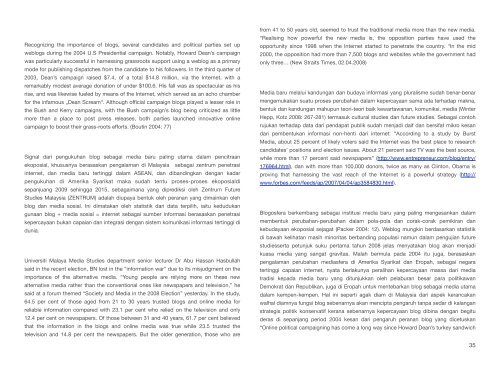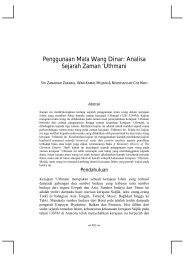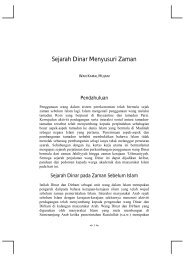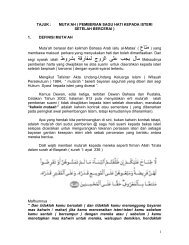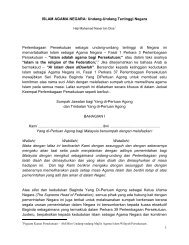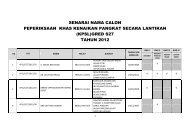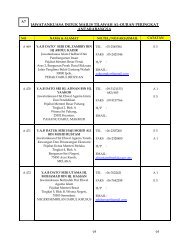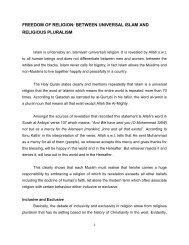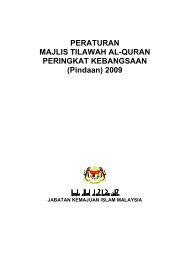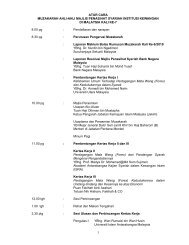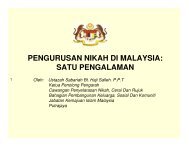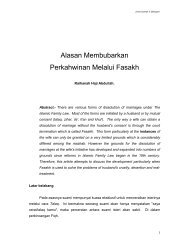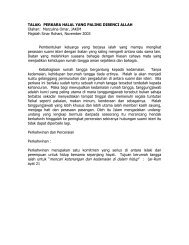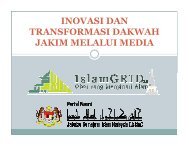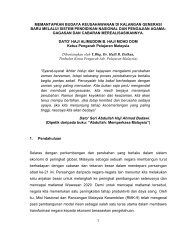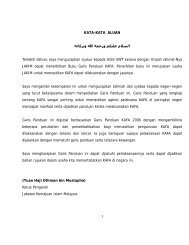Media Future: - Jabatan Kemajuan Islam Malaysia
Media Future: - Jabatan Kemajuan Islam Malaysia
Media Future: - Jabatan Kemajuan Islam Malaysia
Create successful ePaper yourself
Turn your PDF publications into a flip-book with our unique Google optimized e-Paper software.
Recognizing the importance of blogs, several candidates and political parties set up<br />
weblogs during the 2004 U.S Presidential campaign. Notably, Howard Dean’s campaign<br />
was particularly successful in harnessing grassroots support using a weblog as a primary<br />
mode for publishing dispatches from the candidate to his followers. In the third quarter of<br />
2003, Dean’s campaign raised $7.4, of a total $14.8 million, via the Internet, with a<br />
remarkably modest average donation of under $100.6. His fall was as spectacular as his<br />
rise, and was likewise fueled by means of the Internet, which served as an acho chamber<br />
for the infamous „Dean Scream“. Although official campaign blogs played a lesser role in<br />
the Bush and Kerry campaigns, with the Bush campaign’s blog being criticized as little<br />
more than a place to post press releases, both parties launched innovative online<br />
campaign to boost their grass-roots efforts. (Boutin 2004: 77)<br />
Signal dari pengukuhan blog sebagai media baru paling utama dalam pencitraan<br />
ekoposial, khususnya berasaskan pengalaman di <strong>Malaysia</strong> sebagai zentrum penetrasi<br />
internet, dan media baru tertinggi dalam ASEAN, dan dibandingkan dengan kadar<br />
pengukuhan di Amerika Syarikat maka sudah tentu proses-proses ekoposialdi<br />
sepanjuang 2009 sehingga 2015, sebagaimana yang diprediksi oleh Zentrum <strong>Future</strong><br />
Studies <strong>Malaysia</strong> (ZENTRUM) adalah diupaya bentuk oleh peranan yang dimainkan oleh<br />
blog dan media sosial. Ini dimatakan oleh statistik dari data terpilih, iaitu kedudukan<br />
gunaan blog + media sosial = internet sebagai sumber informasi berasaskan penetrasi<br />
kepercayaan bukan capaian dan integrasi dengan sistem komunikasi informasi tertinggi di<br />
dunia.<br />
Universiti Malaya <strong>Media</strong> Studies department senior lecturer Dr Abu Hassan Hasbullah<br />
said in the recent election, BN lost in the “information war” due to its misjudgment on the<br />
importance of the alternative media. “Young people are relying more on these new<br />
alternative media rather than the conventional ones like newspapers and television,” he<br />
said at a forum themed “Society and <strong>Media</strong> in the 2008 Election” yesterday. In the study,<br />
64.5 per cent of those aged from 21 to 30 years trusted blogs and online media for<br />
reliable information compared with 23.1 per cent who relied on the television and only<br />
12.4 per cent on newspapers. Of those between 31 and 40 years, 61.7 per cent believed<br />
that the information in the blogs and online media was true while 23.5 trusted the<br />
television and 14.8 per cent the newspapers. But the older generation, those who are<br />
from 41 to 50 years old, seemed to trust the traditional media more than the new media.<br />
“Realising how powerful the new media is, the opposition parties have used the<br />
opportunity since 1998 when the Internet started to penetrate the country. “In the mid<br />
2000, the opposition had more than 7,500 blogs and websites while the government had<br />
only three… (New Straits Times, 02.04.2008)<br />
<strong>Media</strong> baru melalui kandungan dan budaya informasi yang pluralisme sudah benar-benar<br />
mengemukakan suatu proses perubahan dalam kepercayaan sama ada terhadap makna,<br />
bentuk dan kandungan mahupun teori-teori baik kewartawanan, komuniksi, media (Winter<br />
Hepp, Kotz 2008: 267-281) termasuk cultural studies dan future studies. Sebagai contoh<br />
rujukan terhadap data dari pendapat publik sudah menjadi daif dan bersifat mikro kesan<br />
dari pembentukan informasi non-henti dari internet: “According to a study by Burst<br />
<strong>Media</strong>, about 25 percent of likely voters said the Internet was the best place to research<br />
candidates’ positions and election issues. About 21 percent said TV was the best source,<br />
while more than 17 percent said newspapers” (http://www.entrepreneur.com/blog/entry/<br />
176964.html), dan with more than 100,000 donors, twice as many as Clinton, Obama is<br />
proving that harnessing the vast reach of the Internet is a powerful strategy (http://<br />
www.forbes.com/feeds/ap/2007/04/04/ap3584830.html).<br />
Blogosfera berkembang sebagai institusi media baru yang paling mengesankan dalam<br />
membentuk perubahan-perubahan dalam pola-pola dan corak-corak pemikiran dan<br />
kebudayaan ekoposial sejagat (Packer 2004: 12). Weblog mungkin berdasarkan statistik<br />
di bawah kelihatan masih minoritas berbanding populasi namun dalam pengujian future<br />
studiesserta petunjuk suku pertama tahun 2008 jelas menyatakan blog akan menjadi<br />
kuasa media yang sangat gravitas. Malah bermula pada 2004 itu juga, berasaskan<br />
pengalaman perubahan mediasfera di Amerika Syarikat dan Eropah, sebagai negara<br />
tertinggi capaian internet, nyata berlakunya peralihan kepercayaan massa dari media<br />
tradisi kepada media baru yang ditunjukkan oleh pelaburan besar para politikawan<br />
Demokrat dan Republikan, juga di Eropah untuk mentebarkan blog sebagai media utama<br />
dalam kempen-kempen. Hal ini seperti agak diam di <strong>Malaysia</strong> dari aspek kerancakan<br />
walhal diamnya fungsi blog sebenarnya akan mencipta pengaruh tanpa sedar di kalangan<br />
strategis politik konservatif kerana sebenarnya kepercayaan blog dibina dengan begitu<br />
deras di sepanjang period 2004 kesan dari pengaruh peranan blog yang dicetuskan<br />
“Online political campaigning has come a long way since Howard Dean’s turkey sandwich<br />
35


